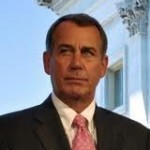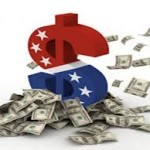![The Harsh Republican Reality of the Fiscal Cliff]()
by | Dec 10, 2012
 I break from a majority of Republicans on the current fiscal cliff negotiations and believe the rate increases that Democrats are seeking should eventually be agreed to. More specifically I would support John Boehner signing on to taking the top bracket from 35% to 37-38% (short of the 39.6% Obama wants).
I break from a majority of Republicans on the current fiscal cliff negotiations and believe the rate increases that Democrats are seeking should eventually be agreed to. More specifically I would support John Boehner signing on to taking the top bracket from 35% to 37-38% (short of the 39.6% Obama wants).
Of course the argument against doing so is the superior one—essentially that the Senate and the President want more money to spend while having not passed a budget in 3 years and having not yet put any real spending cuts or entitlement reforms on the table. But the two Parties have been at a stalemate over this issue for years and in my view the trump card is that last month they held the Senate, picked up seats in the House, and won the Presidency. To me the bottom line is that if a political party never agreed to anything they didn’t think was 100% ideologically or philosophically accurate we would never reach any compromise. This in fact is the definition of compromise, and in light of the election results anyone who thinks Republicans weren’t pushed into a position of forced compromise is fooling themselves.
The reasons for swallowing this bitter pill are multiple. First off, though often times the winner of an election pushes for the passing of legislation saying they ran on it when they really didn’t—that is not the case here. There is no question that President Obama ran on raising taxes on rich people and Mitt Romney ran on lowering rates and capping deductions. Secondly, over 60% of the American people in poll after poll say they want the wealthier among us to pay more taxes. Unfortunately, the alternative of refusing to budge on this issue in favor of tax increases on 98% of Americans is simply not good policy. All sides agree it would be devastating, not to mention it plays into all the awful stereotypes of Republicans and is politically fatal.
Not helpful here is that this whole discussion echoes the earlier scene at a Republican Primary debate where all 10 candidates on stage said they would not take a deal of $10 in spending cuts for $1 of revenue increases—the majority of non-hardliners in this country just flat out won’t deem a political party serious about solving a problem with this kind of position.
Just to be clear, the above is not at all to say I agree with raising any rates, but the facts are the facts. The Democrats have a far stronger hand here—and it’s certainly strong enough to yield this specific tax increase they desperately want.
Looking on the bright side, after suffering the defeat we just had nationally if the only direct price Republicans have to pay is to raise taxes by 2-3% on one bracket in order to get the Bush tax cuts made permanent (until we have a majority to do real reform), then I think one could argue that is not an obscenely high cost. The big part of making this an acceptable outcome is of course what will be given by the other side to reward this concession?
As of now clearly Democrats have not offered anything and are not acting in good faith. Since they don’t have to give on entitlement reform in this situation, essentially Democrats are going to have to agree to hundreds of billions in non-discretionary, non-defense spending cuts. My position is if Boehner gets this in exchange for the small bump in rates, that is an acceptable outcome. If he isn’t able to achieve that—then caving on this position is a major defeat.
The Media Fails Us Again
So far in this “negotiation” Republicans and John Boehner in particular have been getting killed for letting the whole debate revolve around a portion of revenue increase that would fund the government for about 8 days. This is such a great and obvious point, and frankly the shallowness of our national debates in general makes it hard to have much hope for the future of the Republic.
I fully agree with the criticism for Republican leadership losing the messaging war on one hand, but on the other I wonder what more they can do about it. Time and time again they speak of Washington not having a revenue problem but a spending problem, and they certainly are publicly making the case this would fund the government for only 8 days. The reality is that of all the power and influence the liberal media has over this country, perhaps the most lethal and subtle is their ability to decide what the focus of the debate is. For obvious reasons the President wants it to center on a rich vs. poor construct, and low and behold that is exactly what we have.
My Advice To Boehner
If I were advising Republicans I would suggest putting this debate in context by making an obvious point that I have not heard made yet. The absolute proof that we have a spending problem and not a revenue problem is that just to balance the budget in one fiscal year we would have to raise tax revenues by 40%. Yes that’s right, 40% more dollars into the treasury just to get to the point that we are not running a deficit every year—that is without paying down a penny of the $16 trillion in National Debt.
This of course is because in past years we have borrowed 40 cents of every dollar we spent (so far this year it is up to 46 cents of every dollar). The notion that tax rates would have to be raised on the entire country to a level generating 40% more money each fiscal year is so insane that just maybe it could break through the media machine and into view of the population.
The End Game
What’s so frustrating for Republicans, including myself, is how much sense these arguments make and that we can’t even get the Party that controls the majority of our government to even discuss the bigger more frightening picture.
That being said, the reason we have elections is so that each Party can make their case and the people can make their choice. Even though it’s not sound policy, given the fact that this choice has just been made, conceding a few percentage point increase for one tax bracket is not the end of the world.
In spite of all the venom being directed toward the Republican leadership in the House we need to be rooting for them to succeed—which in this case means getting the least destructive outcome in a tough situation.
The post The Harsh Republican Reality of the Fiscal Cliff appeared first on The Conservative Reader.

![The Harsh Republican Reality of the Fiscal Cliff]()
by Steven Waechter | Nov 14, 2012
 Well, Barack Obama will be President for a second term. It is now time to take a look around, and prepare for what is likely to happen next. Based on my observations and what I’ve learned over the years, these are my predictions:
Well, Barack Obama will be President for a second term. It is now time to take a look around, and prepare for what is likely to happen next. Based on my observations and what I’ve learned over the years, these are my predictions:
No Housing Recovery
Commentators have been calling the bottom of the housing market – and screaming with increasing urgency that it was time to buy – since 2007. The Fed has cut interest rates to nearly zero, and through quantitative easing has flooded the financial system with new money. This will continue for the near future, especially since QE-infinity was announced earlier this year. There remains no recovery in the housing market, and there won’t be a recovery.
Bad monetary policy has left the productive bits of the economy in an absolute shambles, and now there simply aren’t enough jobs to allow a recovery in the housing market. This will get worse, not better.
Mass Layoffs
This one will happen sooner rather than later. In an economy that is as sedate as ours the likelihood of reduced unemployment is already pretty slim, and if you consider the looming Obamacare mandates, tax hikes on income, dividends, and capital gains, as well as another four years of an administration that has a penchant for change (breeding uncertainty), I predict that there will be large job losses coming in the very near future.
Growing Poverty
This one seems to fall into place as well, especially for those laid low by the layoffs which I think are coming. But, even those who keep their jobs will experience marked decreases in their standard of living. In an economy where consumption is king and production – or any sort of value-added economic activity – is outsourced, taxed, regulated, or outright banned, the remaining employment opportunities take on a sort of wistful irrelevance. Many will be nominally employed, but at the same time wholly unable to support themselves, let alone able to assemble savings.
Spike in Utility Rates
All forms of energy are likely to get more expensive over the next four years. Obama has explicitly stated that he intends to bankrupt the coal-generated electricity industry in favor of renewable energy kitsch which can only be financially feasible with massive increases in electricity prices. Expect some coal plants to be shut down in the next term, and expect to pay far more for electricity.
High Prices for Oil and Grain
In a past article, I pointed out that since 1990, the United States has run trade deficits in excess of $9 trillion. This despite the fact that in 1990 the supply of dollars (the M2 metric) was only $3 trillion. In an economy where we can buy foreign goods by printing money, there is no reason to manufacture much of anything. This dynamic will continue for the time-being, and we will import shiploads of consumer goods and pay for it with nothing but inflation. This will lead to even higher prices for oil and grain, which are inflation-sensitive commodities whose production cannot be outsourced.
Feeding grain to livestock is a value-added activity, however, and in an inflationary economy the price of grain will go up, and the ability of the public to buy meat will be reduced, so I am predicting a continued decrease in the number of farmers who bother to raise livestock, as well as a decline in the overall size of the livestock herds in the country.
College Tuition Spikes; Enrollment Begins to Fall
Obama’s attempts to reform the student loan industry had nothing to do with controlling the costs of college. The government runs most of the student loan industry, and interest rates have been kept very low for Federal loans. This is all designed to get more kids into college, regardless of what it costs, and with no real limit to the amount of credit available to the college-bound, there are no incentives for colleges to control costs.
The luster has begun to rub off of the whole college experience in my estimation. A college degree has become little more than a very expensive lottery ticket, and new college graduates will not see any discernable increase in their employment opportunities, incomes, or future prospects.
Even with the endless propaganda urging kids to attend college, the decision to attend college will not make financial sense for a large number of American kids, and we will begin to see a decline in enrollments, especially in full-time, traditional enrollments.
((To Continue Reading, Click Here To Go Straight To Part 2))
The post Predictions for the Next Four Years (Part 1 of 2) appeared first on The Conservative Reader.
![The Harsh Republican Reality of the Fiscal Cliff]()
by Steven Waechter | Nov 13, 2012

(This is Part 2 of a 2 Part Series– To Start With Part 1 Click Here)
Dollar Under Strain
There are so many dollars floating around out there, and so little American production for those dollars to chase, eventually foreign central banks will get wise and look to divest. At some point, that trickle could turn into a flood, and result in a dollar run. If that happens, life in America will be rather bleak for a time.
Police State
Obama has consistently lied about his civil liberties stances; campaigning against the Patriot Act and then supporting the renewal, and promising to veto the National Defense Authorization Act, and then signing it. There is no reason to believe he will change course now.
A proliferation of traffic cameras is in my view as predictable as the summer solstice, and I imagine even leftists who believe the government can manage an economy will agree with my prediction that more traffic cameras will be installed across the country. This one has little to do with Obama, but as the economy falters, expect local governments to do anything in their power to claw revenue from the populace. Pay up you filthy peasants!
Rand Paul Rising
It is my expectation – as well as my personal hope, in full disclosure – that Rand Paul will rise further in political influence. Senator Paul from Kentucky will likely become the main leader of the libertarian faction of the Republican Party, upon the retirement of his father from the House at the end of this year.
Within Republican circles there are many who dislike the libertarian faction; indeed, libertarians tend to dislike the war on drugs, military intervention, and social entitlements. This tends to make the Republican establishment both irritated and nervous about their feasibility in elections.
In the near future we will not be able to afford the sacred cows which are held as critical in our current political discourse. There is going to be a movement of dissent, and as things get worse on all fronts, this movement will gain further sympathy.
Best Advice
People often get after me about being filled with gloom, and having no real solutions in mind. Those people often define the term “solution†as plan to preserve the status quo. Change, much like Perestroika, is defined along similar lines.
My best advice is to learn how to do something for yourself. I have been perfecting my recipe for buttermilk pancakes for example. I have an urge to learn how to make my own shoes, but I almost certainly lack the artistic skill necessary.
Politically, I would urge you to start going to your local government meetings and complaining about things that irritate you while you are there. Smart Growth zoning policies irritate me, but I live in an unincorporated area, so my vengeance must be preserved for another issue.
Also, there is never a bad time to buy a gun.
The post Predictions For The Next Four Years (Part 2 of 2) appeared first on The Conservative Reader.

![The Harsh Republican Reality of the Fiscal Cliff]()
by Steven Waechter | Oct 29, 2012
 I cast my ballot early. I didn’t vote third-party and therefore my vote isn’t being wasted. It also isn’t going to matter.
I cast my ballot early. I didn’t vote third-party and therefore my vote isn’t being wasted. It also isn’t going to matter.
Since 1990, the United States has run aggregate trade deficits above $8 trillion. This is funny, because in 1990 the M2 metric of currency supply was only $3 trillion. There should be nothing but dust coming out of the ATM machines. We have purchased entire merchant-fleets full of foreign goods, and paid for it by quite literally printing money.
Foreign countries, being more blatant about their currency devaluation policies, have been willing to go along with this arrangement. The result is this dynamic: The US prints dollars to buy goods from China, and the Chinese central bank prints yuan to buy the dollars. We get cheap Chinese stuff, the Chinese central bank gets huge dollar reserves, and the Chinese people get jobs and lots of inflation.
As the years went by, this dynamic absolutely shattered the productive impetus in the American economy. There is no reason to manufacture anything, or engage in productive activity in general. There is also no reason to hire people to help you be productive.
You can see this dynamic in your own communities, with factories that are closed, the kids that can’t find jobs, and farmers – busy producing inflation-sensitive commodities on land, which can’t be outsourced – buying new trucks with cash. The illness in our economy is bad monetary policy.
In a normal economy, if there is demand for consumer goods, entrepreneurs have to take land, labor, and capital and combine them in a way that produces goods efficiently, and at a price the general public can afford to pay. The American economy has another option – we can simply print money and spend it on imports, which is much simpler, requires no investment of capital or any hiring, and is much cheaper.
The result was the largest consumption binge in history, and an economy dependent on investment bubbles – tech stocks, housing, government bonds. The Federal Reserve poured new money into the financial system. You could get a home equity loan to cover your credit card debt, rung up at retail outlets selling almost exclusively imported goods.
Since manufacturing was on the way out, the service sector was the place to be, and the best service sector jobs require college degrees, so the answer is to go to college. Both parties agreed; the answer wasn’t to address the problems with our monetary system, but to attend college. Every young person was told that college is critical.
Now, we have more people in their 20’s living with their parents, more college graduates than ever are working part time, if they can find jobs at all, and the only policy solutions coming out of our elected officials is to double down on college, fund green energy schemes ( I‘m talking about you, Chuck Grassley) and economic development kitsch projects at all levels, building economic Potemkin Villages designed to try and keep the consumption binge going.
Close down Maytag? No problem! Build a race track! Remember when Nancy Pelosi said that unemployment checks would stimulate the economy? People need to spend, spend, spend, because there is no work, work, work.
Without the inflationary monetary policy coming out of the Federal Reserve, the government could not run the enormous deficits, the trade deficit couldn’t have gotten this large (currency would have become scarce, and productivity more valuable), and the government would have to be honest about the absurd arithmetic surrounding our entitlement programs.
Therefore, neither party will countenance a serious challenge to our current monetary system. Even Paul Ryan’s budget plan – so maligned by the left – doesn’t eliminate the deficit nor tackles entitlements. Sound money might even threaten the defense budget, and is therefore terrorism.
So, Barack Obama champions stimulus programs to re-inflate consumption and crows about tariffs on Chinese tires; Mitt Romney labels China a currency manipulator for being willing to bite the inflation bullet themselves and hold our currency as a reserve.
Work in a factory keeps their people busy and gives them the illusion of progress – a bit like how college keeps young people in America busy and gives their parents the illusion that their children will “amount to something.“ Concerns that college diplomas are worthless and that the wages of the Chinese factory worker are shredded by inflation are secondary.
Offshoring is not the machination of evil capitalists; it is a phenomenon of monetary policy, plain and simple. Other countries are willing to hold our currency as a reserve, so we can buy imports with inflation. According to the Examiner, Jeep is next on deck to offshore.
So, services and technological expertise is the key to success in America, as long as another large, developing economy doesn’t devalue their currency and start holding dollars as a reserve.
Especially not one with a large, English-speaking population, and definitely not one with a past influenced by British rule. Why, if that happened, we could just print money and buy our services from that country, and you would run the risk of not fully understanding the technician’s accent the next time you have to call tech support, which is simply unimaginable.
I cast my vote. I ended up voting for the one that I figure is less likely to throw me into a gulag. I suppose this makes my vote “idealistic.â€
Here we are. We have an economy that cannot produce wealth, based on consumption, with a government that we cannot finance and cannot change. We are consistently running trade deficits in excess of $40 billion per month but are told that we lack demand for stuff, almost 50 million people are dependent on food stamps, and an entire generation is shacked up at home, paying their student loans and otherwise too poor to participate in the consumption economy. Yet, there is no stomach for change.
When debating Walter Mondale in 1984, Ronald Reagan cited Cicero and remarked, “If not for the elders, correcting the mistakes of the young, there would be no State.â€
What are the young supposed to do when their elders who run the government have lost their minds?
The post Waechter’s Final Pre-Election Weigh In: No Matter How You Vote, the Economy Will Not Improve appeared first on The Conservative Reader.

![The Harsh Republican Reality of the Fiscal Cliff]()
by | Oct 25, 2012
 The Des Moines Register’s Editor, Rick Green, last night published some details around an interview that the Register’s editorial board held with President Obama Tuesday morning. An interview they could not, at first, talk about publicly. An off-the-record conversation that they say will contribute to their endorsement decision, and the conditions of which will not affect their decision.  Since Rick’s original online post, the White House has released their own transcript of the conversation.
The Des Moines Register’s Editor, Rick Green, last night published some details around an interview that the Register’s editorial board held with President Obama Tuesday morning. An interview they could not, at first, talk about publicly. An off-the-record conversation that they say will contribute to their endorsement decision, and the conditions of which will not affect their decision.  Since Rick’s original online post, the White House has released their own transcript of the conversation.
To his credit, Rick was clearly frustrated with the White House for putting such severe restrictions on the 30 minute telephone interview. He is convinced that Iowans need to hear what the President had to say, and that Iowans would be influenced positively by what Obama shared with the editorial board. The Register has been consistent in their effort to promote transparency in government, and should be applauded for their efforts.
Obviously, the President’s campaign (did we say “White House”?  Are the two the same?) was sensitive to the impact that even a handful of words can have in the world of instant communication. But this administration has been a paragon of secrecy since moving into 1600 Pennsylvania Avenue, and the 2008 campaign promise of transparency has proved not only to be a ruse, but largely ignored by both campaigns in 2012 and the mainstream media.
Rick’s comments attempt to provide an element of transparency at least to the Register’s process, but it’s unfortunate that he treats the President’s requirements for this interview as inevitable. Â Even though he challenged the decision, he said they “relented and took the call. Â How could we not?” Â I think the Des Moines Register’s influence is adequate enough that if they balked, it would have looked bad for the President and the White House eventually would relent because they would have to. Â How could the Register endorse the President without such a conversation?
But, given the idea that Obama is just so important and powerful a man that he should be listened to, the secondary piece of this was amazing to me. Â Rick stated later in his post that the “the White House’s decision won’t play a factor in our board’s final endorsement decision.” Â Perhaps that was a coded message to the Obama team that just the opposite was true. Â But it escapes credibility to believe that anyone in the Register’s position would not give serious consideration to this and other examples of the President’s opaqueness and attempts to control the messages going out so desperately. Â How the President of the United States tries to hide the most trivial information should have a substantial impact on the Editorial Board’s perception of this administration.
Looking back on this, before the White House released the transcripts, it is wildly crazy that there was any concern about the contents of the interview. Â The transcript was about as mundane as the first Presidential Debate. Â The sense is that the President has a cozy enough relationship with left-leaning media such as the Register that they can talk casually about how they will continue to change America in ways that the public doesn’t need to hear, but that the Register’s editors should hear in order to provide the “right” endorsement. Â Even though the Register apparently wants to avoid any such appearance, this sounds like a lot of back room dealing with members of “the team” to get the endorsement. Â Perhaps the White House figured out that the Register has more integrity than that. Â What concerns me is, what kind of off-the-record conversations are going on with other media organizations? Â We may never know.
By the way, the Register hasn’t actually stated that the transcript was accurate. Â I’m assuming they can tell us one way or the other, can’t they?
Image © Aaron Amat – Fotolia.com
The post Des Moines Register Challenge: Endorsement In Secret appeared first on The Conservative Reader.

Page 1 of 1712345...10...»Last »
 I break from a majority of Republicans on the current fiscal cliff negotiations and believe the rate increases that Democrats are seeking should eventually be agreed to. More specifically I would support John Boehner signing on to taking the top bracket from 35% to 37-38% (short of the 39.6% Obama wants).
I break from a majority of Republicans on the current fiscal cliff negotiations and believe the rate increases that Democrats are seeking should eventually be agreed to. More specifically I would support John Boehner signing on to taking the top bracket from 35% to 37-38% (short of the 39.6% Obama wants).


